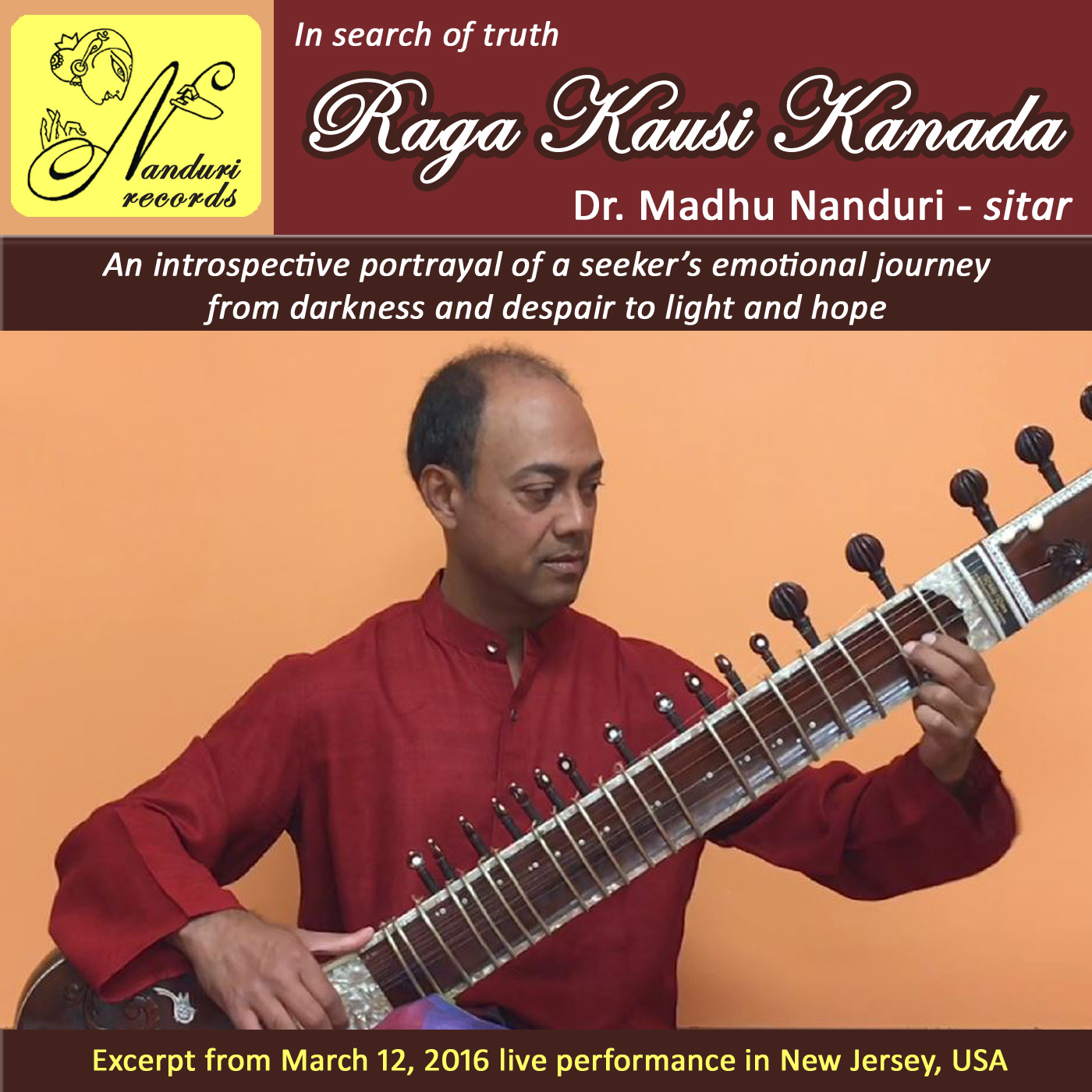
An introspective portrayal of a seeker's emotional journey from darkness and despair to light and hope.
‘Raga Kausi Kanada’ is a 48 minute long extempore rendition by Dr. Madhu Nanduri, a direct disciple of Ustad Vilayat Khan. The music comprises two sections – an alap (un-metered rendering of the raga) followed by jod (un-metered but containing a palpable pulse).
Listen to a sample below. For complete track and notes, scroll further.
A review of the music by NamPaaSaa
Listening to the recording of Kausi Kanada by Dr. Madhu Nanduri was a most rewarding musical experience for me. His style of playing the sitar in this particular piece was entirely different from the styles of other top ranking musicians. This music was not a studio product. Nor was it precomposed or even premeditated. It was an extempore performance on stage at a program dedicated to the memory of world renowned sitar maestro, the Late Ustad Vilayat Khan, on the occasion of his death anniversary in New Jersey, USA, in May 2016. I did not attend the program, since I was in India on that day. I received the recording of the music through email, a few days later. I was told that Madhu had no idea of releasing the music publicly. Actually, he wanted to play 'Rageswari', one of the most favorite ragas of the late Ustad, on that day. But since that raga was presented by some other artist just before him, Madhu decided to play raga ‘Kausi Kanada’ on the spur of the moment. This raga is a mix of two celebrated ragas - Malkauns and Darbari Kanada, and seems to be an ideal vehicle to portray pathos, contemplation and introspection.
While listening to the music a strange scene, from the ancient Indian epic Mahabharata, came to my mind. This was the scene:
It was 35 years after the Kurukshetra war that claimed millions of lives. The number of men crippled for life, women widowed and children orphaned was inestimable. Armies from all over the country took part in the war even though they were least concerned with the enmity between Kauravas and Pandavas. Pall of gloom and utter desolation pervaded throughout the length and breadth of the country after the war. The end of Dwapara was fast approaching and there were ominous signs of impending holocaust.
The music begins with Arjuna sitting alone on the terrace of his palace in Hastinapura brooding over the past, the aftermath of the war. The sky is slowly coming under the dark blanket of night as the sun is setting on the western horizon.
After the war and the Aswamedha that followed, Krishna finally took leave of the Pandava brothers and left for Dwaraka. There were no meetings between them ever since. But, Krishna and Arjuna were in touch with each other on mental plane now and then.
Presently, Arjuna pours out his heart to his dearest friend who is far away in Dwaraka:
"Why was the war waged at all? Was it inevitable? From the beginning we were against bloodshed. War was thrust upon us. I must have killed thousands of innocent armed men. I have no enmity against them. The enmity was only between the sons of Dhritarashtra and Pandu. We should have settled it between us in direct combats sparing millions of lives. Krishna! I expressed my grief at the very beginning of the war. But you somehow convinced me of the dire need of waging war to uphold dharma."
"Two days after the 18 day war we, Pandava brothers and you along with our mother Kunthi Devi, Dhritarashtra, Gandhari, and many others visited the battlefield. We all waded through the bodies of the dead soldiers that lay strewn all over. We witnessed horrible scenes of vultures feasting on the bodies of the heros of the war."
Arjuna enters into a state of deep contemplation and introspection.
The style of playing sitar is unique, suggesting brooding, questioning, listening, arguing, discussing - mostly through staccato notes, short meends and also silences in between. The structure and the very nature of the raga itself is complex. The choice of this raga by the artist is very apt to express his state of mind at the moment. At times, during the course of Arjuna’s dialogue with Krishna, just a single staccato note or a single stroke of mizrab poses a question, makes a point, or just a nod. The sequence of passages form an altogether new syntax/grammar of sitar playing. To me, it is Madhu’s original innovation. Nobody has ever tried these ideas. These are not gimmicks, every note is meaningful. As Arjuna recollects the horrible scenes of soldiers groaning in pain, sitar weeps in unbearable agony. As the music moves into higher reaches, speed increases, suggesting the intensity of Arjuna’s grief.
Arjuna then feels a comforting and caressing touch of Krishna’s hand on his shoulder. "Arjuna! I am no different from you. We are one soul in two bodies. I identify with every one of your sentiments. But what had happened was unavoidable. It had to happen. This was happening in every age."
Here, we don’t see Krishna as an Avatar. We see him only as a great human. In his last days he lost all control over his own men. Everyone was finding fault with him for all that had happened over three decades ago at the Kurukshetra war.
This scene was conjured by me and it was purely my own subjective feeling. I have no idea of what was on Madhu’s mind at the time of playing the music.
Credits
Notes: NamPaaSaa
Cover photo: Aparna Nanduri
